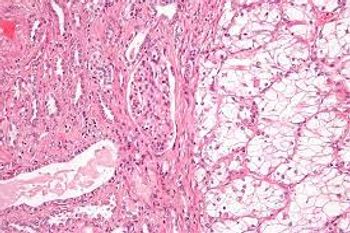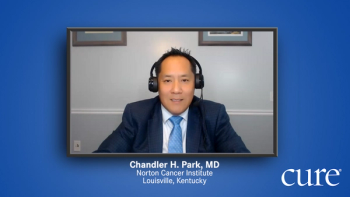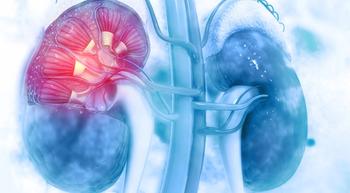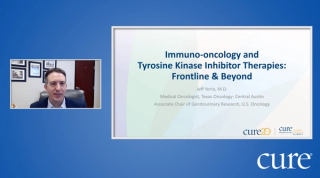
Kidney Cancer
Latest News
Latest Videos

More News

The Welireg-Cabometyx treatment combination demonstrated anti-tumor activity for some patients with clear cell renal carcinoma, according to a phase 2 trial.

Patients with advanced clear cell renal cell carcinoma treated with zanzalintinib had experienced promising antitumor activity with manageable toxicity regardless of prior treatment with cabozantinib.

Researchers continue to investigate novel immunotherapy drugs for the treatment of renal cell carcinoma.

Although research has delved into the potential link between clonal hematopoiesis and heart-related events such as heart attacks and strokes in patients with kidney cancer, more research is needed to further understand this association.

Circulating tumor DNA — which is observed via blood test — may be helpful in determining which patients with kidney cancer need more intense treatment and who can have their therapies deescalated.

While translocation renal cell carcinoma tends to respond well to immunotherapy, there is still a need for more investigation into targeted therapies for this patient population.

Expert oncologists offer closing thoughts on emerging therapeutic strategies, unmet needs, and the future of kidney cancer treatment.

Chandler H. Park, MD, discusses the role of support groups and outlines resources available to patients with kidney cancer.

Welireg led to improved time to progression and objective response rates compared to Afinitor for patients with advanced clear cell renal cell carcinoma, according to study findings.


Tian Zhang, MD, MHS, provides an overview of the treatment of patients with non–clear cell renal cell carcinoma.

An overview of the treatment protocol for patients with advanced RCC who are receiving IO/TKI or IO/IO combination therapy.

Patients with intermediate- or poor-risk clear-cell metastatic renal cell carcinoma saw improved response rates with Opdivo with or without Yervoy.

From Julia Louis-Dreyfus opening up about her breast cancer experience to Dolph Lundgren discussing his experience, here’s what’s happening in the cancer space this week.

Genitourinary oncologists discuss the safety and efficacy of IO/TKI and IO/IO combination therapies in advanced renal cell carcinoma.

Expert perspectives on the decision-making process for selecting frontline systemic therapy for patients with advanced renal cell carcinoma.

A comprehensive overview of systemic therapies available for the treatment of patients with advanced renal cell carcinoma.

Experts in the field of kidney cancer discuss the risk stratification process for renal cell carcinoma and its effect on prognosis.

Clinical insights on the typical presentation of kidney cancer and the diagnostic process.

Chandler H. Park, MD, and Tian Zhang, MD, MHS, give an overview of renal cell carcinoma (RCC) and outline disease risk factors, symptoms, and prevention strategies.

The FDA granted Welireg a priority review after it showed promising outcomes for patients with pretreated advanced renal cell carcinoma.

Treatment with Welireg significantly improved progression-free survival rates in patients with advanced renal cell carcinoma, the most common type of kidney cancer.

From Jill Martin revealing an updated about her cancer to Casey DeSantis announcing breast cancer diagnosis, this is what’s happening in the oncology space this week.

Patients with metastatic clear cell renal cell carcinoma who received corticosteroids during Opdivo treatment did not experience a negative impact on survival.

Even with the increase of immunotherapy utilization to treat patients with advanced renal cell carcinoma, more research is needed to determine in which order to administer it as later lines of therapy.











